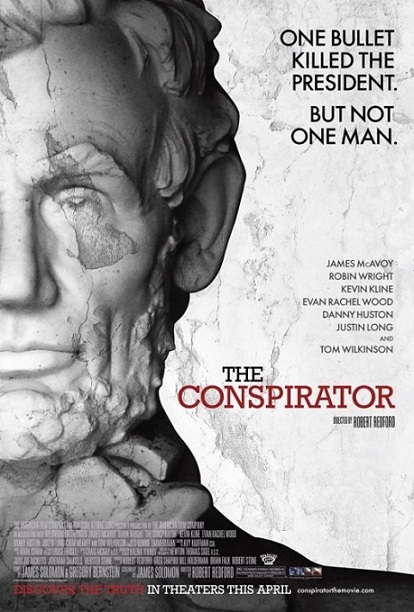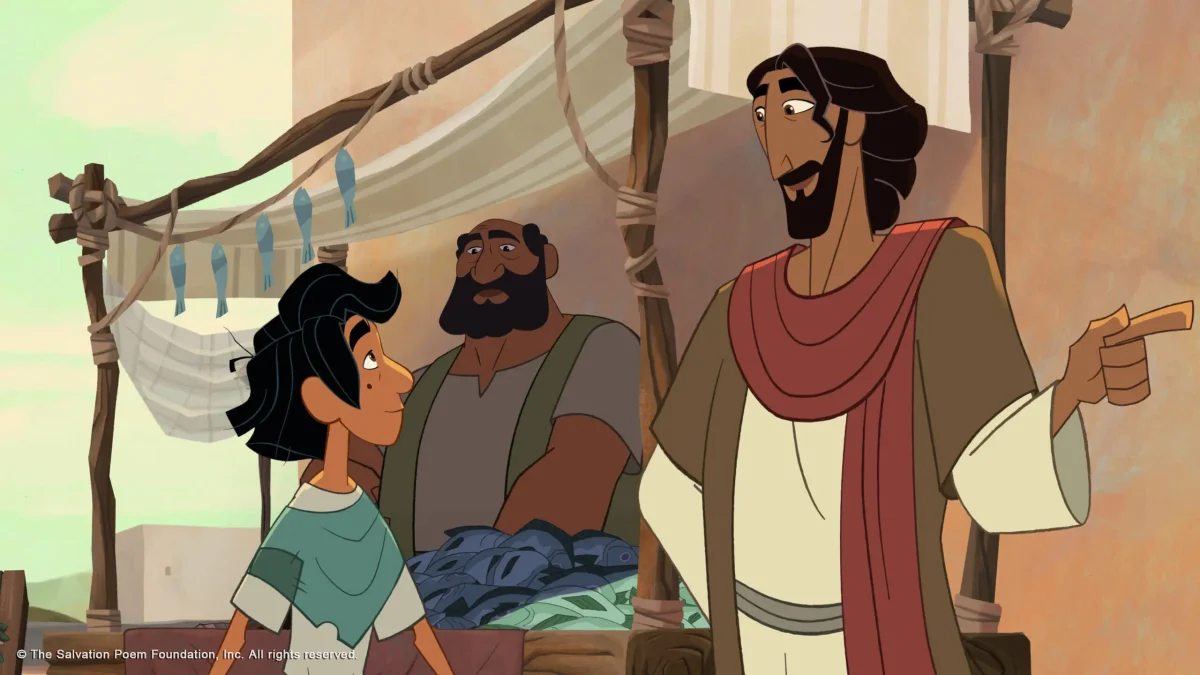What do Princess Buttercup, the Mac guy, and Mr. Tumnus have in common? Well, Abraham Lincoln and justice, of course.
Coming to theaters April 15, [The Conspirator] (conspiratorthemovie.com) tells the story you thought you knew. Boasting a stellar cast, including The Princess Bride’s Robin Wright, Mac icon and actor, Justin Long and Lion the Witch and the Wardrobe’s James McAvoy, this movie follows the events that unfolded during the chaos after the Lincoln assassination.
Produced by [The American Film Company] (theamericanfilmcompany.com) and directed by [Robert Redford] (http://www.imdb.com/name/nm0000602/), this film artfully tells a compelling and thought-provoking story, ripped from the pages of time, which one may find has strong ties to the present, as well as food for thought for the future.
The Story
The Conspirator’s tagline claims “one bullet killed the president, but not one man.” After the tragic murder of Abraham Lincoln, it is discovered that John Wilkes Booth was not acting alone. Eight conspirators are arrested—seven men, and one woman. Mary Surratt (Robin Wright), the owner of a boarding house is charged with conspiring with this band of men, including her boarder, John Wilkes Booth, to assassinate President Lincoln. A young lawyer and Union war hero, Frederick Aiken (James McAvoy) is assigned to defend her in court. Reluctant, Aiken resents that he is asked to defend such a devious criminal. As Aiken builds his defense, though, he is surprised to find that there is no evidence against Mary Surratt. She is being used as bait to draw out the only conspirator that the police were unable to catch, John Surratt, her son. In a courtroom full of hostile prosecutors and prejudiced judges, Aiken fights to save the life of an innocent mother from consequences belonging to her son.
From Screenplay to Screen
Inspired upon discovering this new twist on such a widely known historical tragedy, James Solomon wrote the screenplay for The Conspirator in 1993. It was picked up by The American Film Company in 2009. In search of a director, this new film company, established in 2008, had low hopes for snagging a director with as much experience as Robert Redford. Nonetheless, the company sent Redford the screenplay. TAFC was delighted when, after taking only four days to read the script, Redford called for a meeting. He wanted in.
In a press conference on March 5, director Robert Redford explained that The Conspirator tells a story unknown connected to a story everybody knows. That’s what drew him to direct it, he said. He loves that the film is a blend of war drama, period film and legal drama. This brings interest and depth to the film.
Work on the film began quickly as Redford hoped to complete the filming in less than a year. Redford was heavily involved with the casting process, having started his own career as an actor. “I wanted McAvoy and Robin right off the bat,” said Redford. He also enjoyed working with Justin Long, who provides some comic relief in this thriller. “You had to keep reminding Justin that it was 1865,” said Redford.
Accurate landscapes, despite difficulty
The film was “very low budget” and seemed it might be impossible to make, seeing as the film team needed to recreate a vivid and accurate portrayal of 19th century, post-Civil War Washington. Redford claims it was “killer” to try to film historical landscapes.
Most of the landscapes were shot in Savannah, Georgia. The film team traveled from Rhode Island to Florida to find a location, but Savannah was the only one they could use. There was little space, and the locations were hard to duplicate because America has changed so much. Redford found the challenge was exciting.
In the [film’s production notes] (http://www.cinemareview.com/production.asp?prodid=6384), the filmmakers revealed that the effort to be accurate did not halt at the set and landscapes. Hours upon hours went into researching the facts of the story as well as information on the culture, fashion and jargon of the era. Solomon used the actual trial transcripts when writing the screenplay and a team of researchers went over the storyline and dialogue to ensure that it was as correct a representation as possible. Redford shared the writer and producer’s respect for sticking to the truth of history, describing himself as a “stickler” for accuracy. “It’s becoming more and more rare to be accurate…so it’s a big deal to me,” said Redford.
Redford claims he would not have produced the movie if it were a straight historical narrative, though. He was intrigued by the unique parallels it has to today’s world. While he says there are certainly political ramifications for present day, Redford would like the audience to discover these insights for itself. He believes political propaganda would’ve hurt the film, because it’s more about the story and characters.
Is The Conspirator worth seeing?
On their website, The American Film Company states that it is “founded on the belief that real life is often more compelling than fiction.” The Conspirator’s retelling of history shows this belief to be well-grounded. The film makes history come to life in a way that pleases the eye, stimulates the mind and moves the heart.
The cinematography, dialogue, settings and cast alone make the film worth seeing. The actors are fantastic and believable. They successfully play on a range of emotions, making the viewer laugh at one part, cry at another. The historical landscapes the team recreated are vivid, beautiful and raw. Redford’s use of lighting throughout the film is incredible.
The story is the real clincher, though. It is informative, teaching the audience the little-known but important events following a well-known trgedy. It is moving. It is relevant.
As the plot, characters and scenery pull the viewer into the past, he or she may suddenly find him or herself to have been viewing the present all the while. Having experienced another national disaster in 2001, Americans may be able to identify with the hurt, anger and indignation of the people and government officials in the movie. The question is, how far can those feelings take us in the quest for justice? Do they help or hinder it?
The Conspirator brings up important questions about justice, faith and politics, that are beneficial for anyone and everyone to ponder. The viewer will be entertained and enriched.







